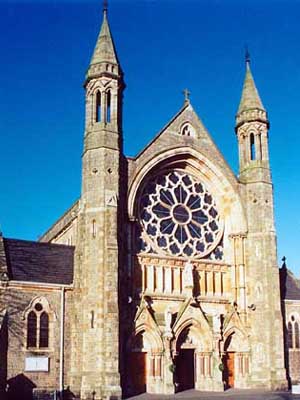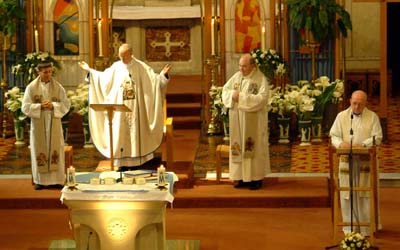 |
|

The church: Most Holy Redeemer, Clonard Monastery, West Belfast, Northern Ireland.
Denomination: Roman Catholic. The church is administered by the Redemptorist Fathers.
The building: This neo-Gothic church looks much larger inside than outside. No – it actually is much larger, as will be seen. The interior is vast, ornate, magnificent. Photographs bear no comparison to the depth and texture of the real thing. Every inch of wall, ceiling, archway, alcove and window is adorned with pattern, carved, inlaid with gold, or set with intricate mosaic tiling. Every corner has a side chapel or shrine. At each pace you pass a statue, a marble pillar, the door to a confessional, one of the stations of the cross, an array of candles or a bowl of flowers. One altar is dedicated to Our Lady of Perpetual Help, another to the Sacred Heart. Above the main altar is a golden mosaic depicting Christ with Mary and St Peter. Multifaceted surfaces actually do increase the size of an area, they don't just seem to – think of what is involved in measuring a coastline. The myriad patterns here draw you into a contemplation of the infinity of inner space, while imparting a marvelous acoustical quality. Enter with wonderment!
The church: The Redemptorist Fathers are known for their ecumenical work. During years of bombings and shootings, some Belfast pastors were reinforcing their own congregations? prejudices, while others carefully avoided mentioning current events. Clonard's preachers took the Troubles by the throat, challenged prejudices in their own pews, and insisted on praying for the enemy. "Unity pilgrims" from this parish regularly visit churches from the main Northern Irish Protestant denominations (though not as mystery worshippers, and preferably not masked).
The neighbourhood: This is the heart of nationalist West Belfast. Just off the Falls Road, and not far from the "peaceline" separating it from the loyalist area, this neighbourhood lived through some of the worst rioting and murders. British soldiers, regarded here as an occupying force, patrolled these streets day and night in armoured vehicles and on foot, and hovered above in helicopters. A gable end painting depicts a revered political martyr with the cryptic statement "Everyone, Republican or not, has his part to play." Nearby, another mural portrays the Blessed Virgin.
The cast: Several priests concelebrated the mass; another preached the main sermon and yet another the mini-sermon at the end. These are some of their names (I may have missed a few): Father David Louch; Father Joze; Father Michael Browne; Father Michael Kelleher; Father Peter Burns.
Solemn Novena, 11.00pm. A novena is nine days of masses, and this was the last mass on the last evening of the annual novena. Devotees come from all over Belfast and beyond to honour and ask favours of Our Lady of Perpetual Help.
How full was the building?
Half an hour before the start, the large car park was full and so were the neighbouring streets. The porch was crowded and so were the pews. I went around the side and up a spiral staircase to the gallery, where there were a few spare seats, but a glass partition made the area seem isolated. I decided to explore the adjoining monastery, where chairs were set out in rooms and corridors, with loudspeakers broadcasting the hymns which thousands were already singing. At last I entered the nave through a side door, negotiated a side aisle against the flow, and somehow found a seat in a back corner. People were sitting on steps or taking up standing positions in the aisles; stewards were asking people to move along the benches and escorting old ladies to the resulting spaces. A little girl with a ponytail, in blue jeans and a white blouse, sprawled on the altar steps. And all this despite the lateness of the hour. It was pretty full, though I've heard there are crowds in the streets for some novena masses.
Did anyone welcome you personally?
A steward wearing a Clonard Novena tabard jokingly pretended we weren't allowed to walk through the car park since we weren't cars. You may not see this as welcoming, but if a Belfast man makes a joke at your expense, it's a welcome.
Was your pew comfortable?
I was lucky to find a square chair, with a firm padded seat, in a small recess with about ten other seated worshippers and St Gerard Magella, who remained standing and politely allowed us to occupy his shrine.
How would you describe the pre-service atmosphere?
People were writing petitions and putting them in boxes. People who had found a seat or a space to stand were singing, as were people moving along the aisles. Some were on their knees, waiting for confessions, which were still in progress at the end of nine days. (OK – add your own comment about the sins of West Belfast's Catholics.) People were crowding into every available space, but there was no jostling. There were babies in their mothers' arms, but none crying. No one spoke, except quietly and when necessary. Not a word of chatter. The church was filled with sound, but paradoxically it was hushed.
What were the exact opening words of the service?
"Goodnight, everyone," followed shortly by "In the name of the Father, and of the Son, and of the Holy Spirit."
What books did the congregation use during the service?
Everyone had a booklet called Come, Lord Jesus: Redemptorist Mission and Novena Book, which was used for some of the communal prayers. Most of the hymns were on a sheet the priest kept referring to but nobody seemed to have.
What musical instruments were played?
An antique organ, made in Belfast and recently restored, enabling the church's programme of musical events to include organ recitals.
Did anything distract you?
Everything. The music was a distraction from the words. The decor was a distraction from the sermon. The totality was a distraction from everything else, if that's not a contradiction – or even if it is. This sort of distraction is to be recommended.
Was the worship stiff-upper-lip, happy clappy, or what?
Despite being called solemn, it seemed joyful and hopeful. Parts of it might be seen as superstitious. Worshippers had brought devotional objects from home to be blessed; intoning a prayer, the priest showered these with holy water, explaining that the blessing would penetrate all sorts of materials, so there was no need to take things out of bags. This advice was ignored, and holy pictures, prayer books, statues and rosary beads were held out to catch the falling drops. I couldn't find a suitable item, but I was holding a pen at the time, so perhaps that received a sprinkling of grace.

Exactly how long was the sermon?
16 minutes.
On a scale of 1-10, how good was the preacher?
6 – I'd say Father Kelleher's style was somewhat contradictory, since he began with a joke which bore no relation to the rest of the sermon, which was serious in tone and emphasised the significance of woman. He spoke of the motherhood of Mary, and told a personal story of the father of a young suicide victim, who had confided to him that he now knew what it was like to stand at the foot of the Cross. Although I could not hear every word clearly, I do not think he explored sufficiently the theological implications of comparing Christ's death to suicide. Maybe that will be another sermon.
In a nutshell, what was the sermon about?
The subject was devotion to the Virgin Mary. At each mass when petitions are read out, we hear of the burdens and yearnings of others, and come to know we are not alone in carrying our cross. Some Protestants hold that Catholic devotion to Mary is heretical – Martin Luther once described Mary as the woman who breast-fed God, rocked God to sleep, and made soup for God. But in connecting with Mary's experience at the foot of the Cross, we gain the hope that our crosses will be temporary and that we will experience the resurrection in our own lives. (For some reason I thought of Tolstoy. Not sure why.)
Which part of the service was like being in heaven?
A simple Latin refrain – Ave Maria, gratia plena, Dominus tecum, benedicta tu – sung to a haunting melody by thousands of devotees.
And which part was like being in... er... the other place?
The thought that now I'll have to go and look up all Tolstoy's religious works. Or was it something in his fiction I was reminded of – or his philosophy of the arts? I seem to have gained a new and heavy burden – the complete works of Tolstoy.
What happened when you hung around after the service looking lost?
The service didn't actually end. The end of the mass came and we all received a blessing, then a speech-cum-sermon thanking stage hands, lighting crew etc. while pointing out that this had been no mere show. The priest then remarked that everyone seemed to be waiting for something, and wondered if he was expected to lead a tour of the country in song. This seemed to be the case, and he began with a solemn rendering of the anthem "Galway Bay." Then, still at the altar, he called for a guitar and had the entire congregation clapping along to a Belfast ditty "I'll tell me Ma," which I'm pretty sure is of Protestant origin. I'd have stayed, but it was already 15 minutes past midnight, and I'd promised to meet my neighbour, who was giving me a lift home to the other side of town where we are a comparatively boring lot.
How would you describe the after-service coffee?
Maybe there was going to be coffee after all 32 songs (you can't leave out any of the counties of Ireland), but maybe there wasn't. Anyway, I had the impression that this community are practised in surviving on spiritual nourishment.
How would you feel about making this church your regular (where 10 = ecstatic, 0 = terminal)?
7 – If I was obliged by law to stick to one church, this one would do. Not sure I'd manage it every Sunday, but they're not quite as persnickety about the law on this side of town. Allegedly.
Did the service make you feel glad to be a Christian?
The juxtaposition of politics and religion here is unsettling, especially when you don't agree, except in broad terms, with either; but why pursue comfort when you can explore infinity? I'm beginning to see what this devotion thing is all about. (That's a yes).
What one thing will you remember about all this in seven days' time?
War and Peace.
| The Mystery Worshipper is sponsored by surefish.co.uk, the internet service provider from Christian Aid. By offering email services, special offers with companies such as amazon.co.uk and smile.co.uk, surefish raises more than £300,000 a year for Christian Aid's work around the world. Click here to find out how to become a Mystery Worshipper. And click here if you would like to reproduce this report in your church magazine or website. Top | Other Reports | Become a Mystery Worshipper! © Ship of Fools 2005 |